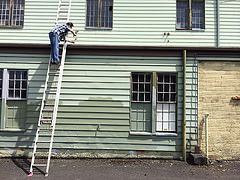What Every Homeowner Should Know About Roof Inspection
 Which part of a house is the source of over one third of all homeowners insurance claims? If you answer "the roof," you're right on the money. A leaky roof is not just annoying, but can also lead to all sorts of problems. For example, dampness and mold resulting from a leak threaten your home's structural soundness, as well as your physical health. Water leaks can even get into your electrical system, where they may cause power outages and fire hazards. However, professional roof inspection is a way to pinpoint potential problems before they become serious.
Which part of a house is the source of over one third of all homeowners insurance claims? If you answer "the roof," you're right on the money. A leaky roof is not just annoying, but can also lead to all sorts of problems. For example, dampness and mold resulting from a leak threaten your home's structural soundness, as well as your physical health. Water leaks can even get into your electrical system, where they may cause power outages and fire hazards. However, professional roof inspection is a way to pinpoint potential problems before they become serious.
Why Do You Need a Professional Roof Inspection?
The purpose of a roof inspection is threefold -- to assess which roof repair is needed, if any; to estimate the roof's remaining lifespan; and to issue a certificate of inspection (which may be valid for 2-5 years, depending on your location). This certificate can be a selling point if your home is currently on the market.
When you are in the process of purchasing a house, don't expect your home inspector to thoroughly check the roof. Although he or she will point out any trouble signs visible from the ground, the home inspector will not perform a rooftop inspection and cannot give you an estimate of how much longer you can reasonably expect the roof to last. That is the task of a roofing inspection specialist.
Nor is roof inspection a job for the layperson. Walking around on the roof when you don't know what you are doing is dangerous for both you and your roofing. A trained roofing inspector is knowledgeable in safety procedures and has the proper equipment. What's more, a qualified roof inspector is capable of spotting potential problems which are not evident to the untrained eye, such as hail damage that will lead to leaks.
When Should Your Roof Be Inspected?
There are four occasions when it is recommended to have your roof inspected:
1) After a new roof has been installed to ensure that the work has been completed according to your area's building code
2) Following a major storm, such as a hailstorm or hurricane, to verify whether there has been damage to your roof and allow you to make an insurance claim, if applicable, within the deadline
3) When you are preparing to sell your home, or are interested in purchasing a new property
4) As part of routine household preventive maintenance.
Do not assume that your roof will be problem-free for the entire duration of your warranty period. Also avoid making the mistake of relying on your warranty to bail you out if you experience problems with your roof. Read the fine print; often a warranty will stipulate regular professional roof inspection as part of the necessary maintenance that you are required to perform.
What Will the Inspector Look at?
The roofing inspector you hire will have a detailed checklist of items to look for. These include:
- roofing material -- its general condition; wear and tear; damaged, curling, loose, or missing shingles or fasteners; greater-than-normal granule loss from asphalt shingles
- exterior roof structure -- sagging or other deformation; deterioration; staining; damage or rot to flashing, soffit, or fascia; gutter clog or inadequate pitch
- the roof's interior condition as seen from the attic -- cracks; staining or dampness; and roof or window leaks
- the ceilings under the attic -- once again cracks, stains, and moisture
The inspector will also inspect and evaluate recent repairs that have been made to the roof.
Upon completion of the examination, the inspector will issue a written report, noting any problems and recommending follow-up action if necessary.
Laura Firszt writes for networx.com.
Updated February 21, 2018.
Looking for a Pro? Call us (866) 441-6648

Roofing Average Costs
Roofers Experiences

Emergency Roof Repair To Replace Broken Shingles

Roof Repair To Keep Out Miami Rainstorms



